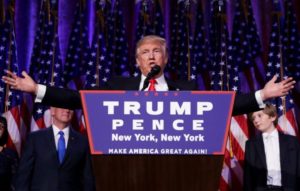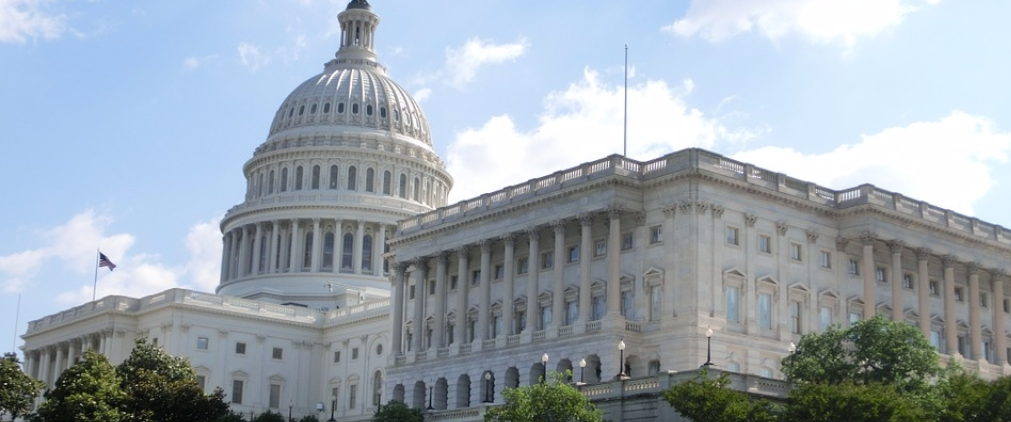The Trump Inauguration and Presidency – How it can affect us all
On Friday 20th January, the Presidency of the United States of America will change hands from Democratic President Barrack Obama to Republican Donald Trump. Much has been made of the potentially divisive nature of the coming Presidency and how someone with no political experience has managed to become the most powerful person on the planet. The first official event of President Donald Trump; the inauguration, has been beset with issues and problems. Countless bands and singers have refused to play or cancelled their participation in the traditional music concert that accompanies the inauguration. There are also protest marches planned with many elected politicians refusing to attend due to Trump’s conduct, legitimacy and refusal to undergo the usual background checks when running for the position of President. But when Trump does become the 45th President of the United States, his actions and decisions will have far reaching consequences – not just for America, but potentially for every country around the world.
America’s past and future
When we look at what the next four years could potentially hold, we also have to look at the previous administration in order to give proper comparison and analysis. In one of his last official acts as President, Barrack Obama commuted the prison sentence of Chelsea Manning-the US soldier who was convicted of leaking highly damaging and embarrassing state secrets. Having initially been given a 35-year sentence for stealing the information and sharing it with the whistle-blower website Wikileaks, it has been protested by many who feel the sentence far exceeded the crime: soldiers convicted of murder or rape have received far lesser punishment. President Obama’s reduction of Manning’s sentence to just 7 years has angered the Republicans and President Elect Trump who have branded Manning a threat to national security, believing this sets a dangerous precedent for future “traitors”.
President Donald Trump and the Security Services

Issues such as state secrets, hacking and foreign political interference further raises the prospect of a clash between the American Security Services and President Trump. Following the recent explosive news stories of Russian interference in the American election via false news stories and the state sponsored hacking of email servers, the subsequent leaked) dossier by the CIA of a potential blackmail plot involving Donald Trump being filmed with Russian prostitutes shows how volatile the situation can quickly become. The release of this information by the CIA caused an angry backlash from Trump who accused them of a dereliction of duty. Following this fundamental breakdown of trust between the incoming President and the Security Services, what does this mean for national security and world peace?
This lack of a clear and agreed approach to national security and defence could potentially generate factions within the most powerful Government in the world, leading to a massive power struggle and protracted political conflict. However, it is not just internal political power struggles the American people will be faced with over the next 4 years. With multiple protest marches planned, and the growing popularity of movements such as “Not my President”, the next 4 years promise to be some of the most divisive and difficult in American history. Not since the 1960s and the rise and implementation of black civil rights has America faced such a growing challenge to its traditional political and cultural status-quo. While the civil rights movement was a force for good and social justice that ultimately made the country a better place, the likely coming actions of the Trump presidency don’t promise the same kind of positive outcome or inclusive agenda.
Social injustice and the denial of healthcare
Even though he has not even taken office yet, President Trump and the Republican Party have already taken steps to undo several key laws sworn in during the Obama administration. The much lauded and needed social health-care programme, popularly known as “Obama-Care” has entered the first stages of repeal following Republicans gaining control of the Presidency and maintaining a controlling majority in both the Houses of Congress and Senate. This decision could potentially leave up to 30 million Americans without any kind of health cover, with a possible replacement Republican plan yet to see light of day. With even the most basic medical prescriptions potentially costing an uninsured American between $500-$1500 a month, countless individuals could be condemned to live their lives in a constant state of suffering. The planned repeal of the healthcare plan could have far reaching consequences, forcing those without the means or ability to acquire medical insurance to incur huge debt, a decrease in quality of life or in a worst case scenario – death. The fact that the richest and most powerful country in the world takes such a view towards healthcare may seem alien to Europeans who have long had access to socialised health models, but it should act as a stark warning when considering the new power structure at the top of the US Government and how they approach difficult and divisive issues.
What does this mean for the rest of the world?
This raises further concerns when looking at the new Government under Trump. If the American Government can take this approach to their own healthcare, what extreme approach will they take when it comes to other countries and cultures that do not fit in with its new narrow and dogmatic approach to complex foreign affairs? Could this new hard-line direction be a pre-cursor to a new foreign policy and approach to national relationships that could destabilise whole regions across the globe? With Trump already promising to build a wall on the Mexican border and ban Muslims from entering the USA, what will this mean for countries that dare to disagree with him or his policies? But should we really be that concerned? There are a few political pundits who have theorised that this kind of talk was just empty, crowd-pleasing bluster peddled by Trump in order to appeal to the disenfranchised white Middle-America masses, a tactic that has, however controversial, proven hugely successful. Nonetheless given the worrying statements made already at such an early stage in Trump’s presidency, it raises major concerns that the new Government’s attitude and approach to less contentious issues such as foreign relations, trade deals, armed conflicts and immigration will be much less opposed by the American people, resulting in global destabilisation and the legitimisation of inward looking policies and politics by nation Governments.
The old saying goes, when America catches a cold, the world sneezes. Should moves to enact laws on limited movement and a selective ban on immigration be implemented, whilst also increasing military aggression, then other countries will have no option but to respond in kind. We have already seen examples of this occurring, albeit on a smaller scale. The recent BREXIT vote and rise of far right political parties in Europe has shown that there is a very real possibility that we could be entering a dangerous new geo-political era following the longest period of relative peace in human history.
Unlimited power?
With Trump openly attacking and threatening his own security services, it will come as some small relief that there are many checks and balances in-place when presented with an unpredictable Commander in Chief. In recent times President Ronald Regan was believed to be suffering from the effects of Alzheimer’s while in office, though still had access to the nuclear codes and ultimate control of the massive US Military. This scenario shows the importance of the checks-and-balances system America has drawn up and used for more than 50 years to ensure no one man, no matter how powerful, can launch nuclear warheads. The system put in place means that in order to launch a nuclear warhead, it takes the involvement of dozens of independent people, any one of whom can put a stop to the launch process if they feel it is not warranted.
The prospect of a nuclear war is something that is a constant threat in our lives. Though tensions may have diminished considerably since the cold-war, the fact that there are enough nuclear warheads to destroy the world a 1000 times over; ready to be launched at any time, should give us cause for concern. The largest arsenal of these warheads is now under control of a man, who at 70 will become the oldest ever sitting first-time US President to be sworn in (Regan was 69). Across his lifetime, Trump has exhibited a trait profile that you would not expect of a U.S. president: sky-high extroversion combined with off-the-chart low agreeableness. A dangerous combination in any position of power, let alone the ultimate position of power.
How Trump changed the rules
Given the change in America’s approach to security and foreign relations, questions have been asked regarding Donald Trump’s suitability to even be President. Trump was unwilling (despite promising to do so) to undergo the usual background screening procedures required and expected when running for President, such as making public his tax returns. As such it is possible that we could now have a President that is not only morally and ethically corrupt, but also susceptible to being strong armed by more seasoned political campaigners such as Vladimir Putin due to potentially unknown, sensitive and embarrassing personal information. Trump’s failures to also separate entirely from his business interests has also raised concerns that he might use his position to further his personal wealth, creating a massive conflict of interests. When President Jimmy Carter was elected President in 1977, he was forced to sell his family farm in order to avoid a suggestion of any conflict of interests. However, Trump has retained control and ownership of his multi-billion-dollar empire, handing the day to day running to his sons, though obviously still remaining firmly under his control and influence. This flouting of established rules, tradition and ethical standing shows us that we cannot view the coming 4 years of Trump’s presidency in the same way we have approached any presidency previously.
You would probably have to go back to the Presidency of Abraham Lincoln when he passed the emancipation proclamation and freed the slaves in 1863, while engaged in a civil war to find a presidency where such social and political upheaval and change were experienced on an American and worldwide perspective. Though obviously this is all conjecture and we could soon discover that Donald Trump has in-fact been playing a “long-con” strategy on everyone; simply telling people what they want to hear in order to get elected, then enacting and pushing through his own socially conscious and ethical agenda that will benefit all American people.
There is precedent for this course of action. During the fascist rule of Spain, the prospect of democracy and civil liberties remained a fantasy for most. King Carlos of Spain was entrusted and personally selected by General Franco as his replacement following his death as the person best suited to rule of the country and maintain its fascist Government. But once King Carlos took power, he began the unexpected process of dismantling the fascist government stranglehold on the country, and through careful negotiation and compromise, drew up a democratic constitution, freeing Spain and its people. But such occurrences are rare and highly unusual.
What is likely to happen?
The most likely scenario we face will see President Trump rolling back on some of his most extreme election promises, such as banning Muslim immigrants from entering the country and instead generally maintaining the everyday running of the government and country. The one saving grace we have with regards to his position of power is that the American political process has become so convoluted and complex, its puts us in a usual position where we find ourselves for once actually grateful for the overload of bureaucracy and red-tape that will slow any race to change to a crawl, potentially giving the American people and law makers time to reflect, amend and change unjust laws that may be demanded by Trump.
As a background screening company we see security, honesty and safety as the core aspects of our business. In these coming uncertain times we have to assume that the basic human civility we have become used to is going to remain in place. Despite the rhetoric and nationalist tub-thumping by Donald Trump and other right-wing organisations, we have entered into a global community era and as temping as it may be, it is not possible to return to the days of extreme self-interests and distrust of people outside of our accepted cultural standard. Ironically the people who could face the worst aspects of a Trump presidency are the very ones who put him into power. With the removal of socialised health care and distrust of minorities, it is large swathes of the American people who will probably face the greatest challenges and difficulties in the years ahead.
back to news
Working from Home: A badly needed option or an excuse to do nothing?
With the emergence of a new generation of business leaders and entrepreneurs, the traditional working day of a long frustrating commute followed by eight hours of work from 9-5 is being rewritten and re-evaluated. Many companies within the UK are beginning to change and update their working practices in order to appeal to and attract […]

Manage the risks of holding credit card information.
Are you a business that holds credit card and other monetary information? Then this blog post is for you!

Let’s get back to basics – What you need to know background screening.
At CBS, background screening is at the heart of what we do, so in this blog post we wanted to go back to basics and discuss everything you need to know about background screening.

 Contact Us
Contact Us